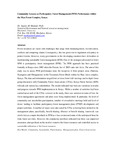Community Lessons on Participatory Forest Management (PFM) Performance within the Mau Forest Complex, Kenya
Abstract
Forest resources are faced with challenges that range from mismanagement, overutilization,
conflicts and competing claims. Consequently, this has given rise to legislation and policy to
protect forests. However, many governments in the developing countries have difficulties in
implementing sustainable forest management (SFM). One of the strategies advocated to foster
SFM is participatory forest management (PFM). The PFM approach has been practised
formally in Kenya since 2005 when the Forests Act of 2005 came into force. The aim of this
study was to assess PFM performance since the inception of three project areas (Nairotia,
Nyangores and Olenguruone) in the Transmara Forest Block within the Mau forest complex,
Kenya. The data and information ranged from reviews from field meetings and in-depth focus
group discussion with Community Forest Associations (CFAs), Kenya Forest Service (KFS)
officials and various key stakeholders. The results indicated that there are variations in results
and progress towards PFM implementation in Kenya. While a number of activities had been
carried out at each of the CFAs reviewed in the study, there was variation in terms of how the
forest management agreements and plans were being implemented. In particular, the level of
community and stakeholder participation, number of consultative meetings held and level of
donor funding to facilitate participatory forest management plans (PFMP) development and
project activities. A number of issues were also noted by CFAs as having been omitted in the
management plans, specifically, benefit sharing. Absence of benefit sharing framework was
cited often as a major drawback in PFM as it has constrained some of the anticipated benefits
from forest activities. However, the community members indicated that there was improved
awareness amongst them on the need to conserve the forest resources and controlled access to
sustainable utilization of the forest resources

